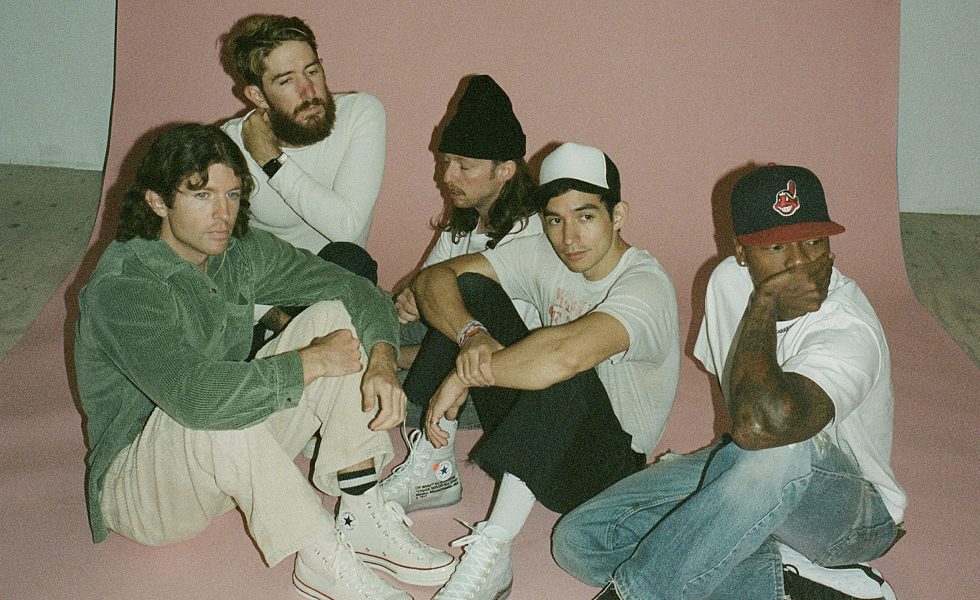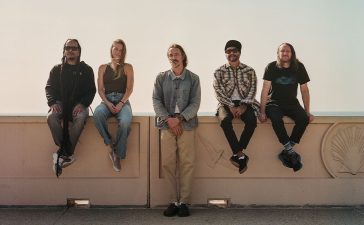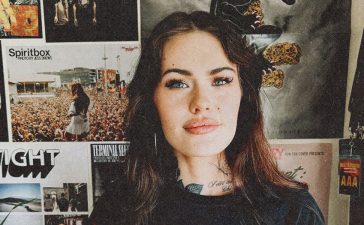From the moment a hazy, kaleidoscopic synth intro welcomes us to ‘Mystery’, to the gauzy fade-out that sends ‘Lonely Dezires’ drifting off into the ether, Turnstile’s long-awaited third album – the equally bold, beautiful and blistering Glow On – is a musical journey unlike any other.
It’s an easy contender for album of the year, garnering critical acclaim from everyone spanning Anthony Fantano through Australian Guitar (a review that, full disclosure, I wrote). It even earned an 8.4 from Pitchfork, which by their metrics, may as well be a 10,000 out of 10. And the hype is well-deserved – though it certainly plays into many of the hardcore tropes we’ve come to know and love in the past few decades, Glow On is also unapologetically experimental, with twinges of psych-rock (‘Underwater Boi’), groove-laden indie (‘New Heart Design’) and Latin pop (‘Don’t Play’) gelling seamlessly with their volcanic, pit-tailored calamity.
NME once branded Turnstile “the new shape of punk to come”, and with Glow On, they’ve not only proved that such a declaration was true, but that in just one album’s time (that story rode the heels of 2018’s Time & Space), they’d become the new champions of punk altogether.
But when BLUNT sits down with frontman Brendan Yates, there’s no “I told you so”, no “Yeah, this was the plan all along”. Turnstile are almost inhumanly wholesome – they’re not in the music game for the accolades or the stature, they’re in it because they have a genuine, palpable love for their art, and the passion they embody in crafting it far exceeds any intention for where it might take them. It’s an oddly calm chat about an album that is undoubtedly ambitious – but then again, Yates had no reason to be nervous about how Glow On would be received…
Even after a solid 200 plays of this album, I’m still picking up on new sounds and little flourishes in the production on each new listen. Was it your intention to make this album one that you could revisit over and over like that?
I think when you have songs, you want to do whatever you can build them in the best way possible, and in having all of these ideas, it was definitely our intention to have [Glow On] be somewhat of a rollercoaster. There’s all these different kinds of songs that sound very different from each other, and we wanted to find a way to present them all cohesively and in a way that makes sense to us.
I think at face value, like, it’s really easy to tell when a band is trying something new either for capital or shock value. But with Glow On, you’ve got a song like “Underwater Boi” sandwiched between ‘Don’t Play’ and ‘Holiday’, and that track stands out, for sure, but it doesn’t feel unnatural or out of place, because you can tell that the artistry is authentic.
That’s cool, thank you! Yeah, I mean, our only goal in making songs is to make something that feels good to us when we’re playing it as a band, and something that’s reflects who we are us as a band, both personally and musically. I think a lot of times, based on someone’s listening perspective, those don’t necessarily add up on paper. But in reality, y’know, if it makes sense to us and it feels good to us, then we put it out – and then it’s up to people to kind of connect those dots for themselves and to understand it. That’s a cool thing, too, because everyone’s perspective is so different.
How much of that comes down to the chemistry you have as a band?
Well, that’s the beautiful part about playing in a band with people you just love, and people that you grew up with – I think there’s a lot to be said about playing and making music with people that speak a similar language and come from a similar place. I think we all have very diverse tastes and we all like different things, but we also understand all the things we like, so when ideas are brought to the table and we’re working on them together, we kind of just have our own established language. It makes a lot more sense when we’re trying something and we’re building a song together, and everyone kind of puts their own personality into it.
Has there ever come a time in the studio where you’ve had to step back and go, “Okay, I don’t think this is gonna work for Turnstile, we can’t do this”?
Oh, absolutely. We do it all the time. A lot of times when when we have an idea, we’ll play it live before it’s recorded, before it’s ever even a demo. Even if it’s just a short, small idea. Because sometimes those will turn into songs – like ‘Alien Love Call’ or ‘Big Smile’ – all those songs from the past started out as these small little ideas that we put into the show, and we eventually turned them into songs. But other times we’d play them one time live and then after the show, we’d be like, “Let’s forget we ever did that. Let’s never talk about that again – that didn’t work, something didn’t feel right.” It’s nice to have everyone on the same page, and have everyone be open to try things. That way, when something feels right, it collectively feels right. And if it doesn’t feel right, you can either try to make it work or you can just move on.
Is there a big vault of Turnstile demos that we’ll never get to hear?
Oh, yeah. There’s a lot. I think our process has always been to make as much music as possible and then wind it down to what feels good for one reason or another. And I think a lot of times, too, if a demo doesn’t work for one project, it might end up being carried over to something else in the future. ‘Underwater Boi’ was, in a totally different light, an idea that we actually recorded for Time & Space. Butit just didn’t seem to make sense at the time, so we took the core of that idea and reworked it into something else that felt like it made sense. I think things just connect with you in different ways at different times in your life, and when we were making Time & Space, the way that we had it then didn’t necessarily work. But the way we built it up after the fact really connected with us, so it made sense for Glow On.
For this record in particular, where were those ideas coming from? What were you mining from to get that surge of creative energy?
I think it always comes in different ways, y’know? Sometimes a song idea starts as a small little melody on a piano, or sometimes a song is just a guitar riff. A lot of times, it will start with just drums – we definitely love to nerd out on drums a lot, and on rhythms and things like that; that’s always a primary focus we have when we’re putting songs together. It didn’t necessarily come from one thing; you have to embrace the elongated process of being open to all kinds of things, and let them seep in naturally.
I’ve been to a handful of your shows over the years, and they’ve always had the most inviting and accepting atmosphere. How do you find that to be an important element of what it is you do, and how do you make it tangible?
That is definitely an important thing, because at the end of the day, we value the ability to play music in a space where people can feel comfortable no matter who they are. We always try to embrace that and create a good space. I think maybe it’s something that happens subconsciously, too, because at the end of the day, when you’re playing music, you’re connecting with other people, and the medium you’re connecting through is music. So at the end of the day, you want to have something that just feels good for not only yourself, but also for the reason you’re there, which is your fans. It’s not just for us, y’know? It’s for everyone. So I think it’s important to always have that in mind.
Glow On is out now via Roadrunner / Warner










